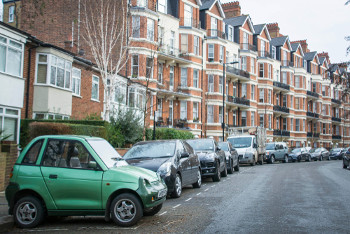The latest UK National Travel Attitudes Study paints a picture of a nation more concerned about pollution and climate change than in the past, but slow to change and often left feeling there are few alternatives to the car.
Among the many survey questions put by government to the public for the 2019 study, there are few with overwhelming majorities or fast moving change, but often what appeared to be a cautious hardening of attitudes.

Electric cars still stand out from the crowd
One clear majority is the 85% of the public, from a sample of close to 1,400 people, who 'believe climate change is taking place and it at least in part due to human actions'.
Another is the 68% of the public who said the condition of roads has deteriorated in the last five years.
There is a growing agreement on connecting environmental and fiscal issues.
Almost four out of five (77%) agree or strongly agree that those who drive vehicles that are better for the environment should pay less tax, and 61% thought exhaust fumes from traffic in urban areas was a serious problem or a very serious problem.
This is a higher agreement rate than at any time since these records began in 2006 - driven by a fairly steady increase over the years in those who 'strongly agree'
This in turn could be driven by the 48% who think it fairly likely or very likely that the next car they buy will be low-emission compared with the 45% who think it not very likely or not at all likely.
Likewise, 43% agree or agree strongly that they would reduce the amount they travel by car to help reduce the impact of climate change, while 32% disagreed or strongly disagreed.
This is the highest percentage in favour of cutting back on car travel since this record began in 2012, with number of people who disagreed to some extent at its lowest level and showing a major fall.
However, things get more complicated when to comes to finding alternatives to the car.
with 42% of people agreeing or strongly agreeing that they could just easily walk many of the journeys under two miles they currently make by car, there has been little change since 2006 - even a slight decrease on other years.
The same pattern is seen when the same questions is asked of bus travel, with only 33% agreeing or strongly agreeing. Meanwhile, 61% still agree or strongly agree that cycling is 'too dangerous'.
There was another clear majority (71%) that were in favour of making residential streets 20mph.
When it came to aviation, passengers were somewhat less inclined to tax for environmental reasons 'even if it became much mroe expensive, with those who agreed or strongly agreed coming to 42%, compared with 32% against and a quarter left undecided.
Register now for full access
Register just once to get unrestricted, real-time coverage of the issues and challenges facing UK transport and highways engineers.
Full website content includes the latest news, exclusive commentary from leading industry figures and detailed topical analysis of the highways, transportation, environment and place-shaping sectors.
Use the link below to register your details for full, free access.
Already a registered? Login